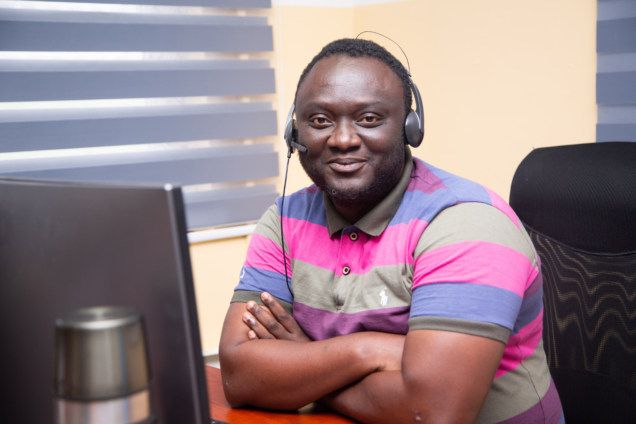A trained nurse and data analyst with the Global Health and Infectious Disease Research Group at the Kumasi Centre for Collaborative Research in Tropical Medicine in Kumasi, Kwaku Duah, is urging nurses to embrace quantitative analysis.
He believes this would amplify the impact of nurses in global health research.
“I am a nurse myself, and I have realized that most nurses dread quantitative analysis (a technique that uses mathematical and statistical modeling, measurement, and research to understand behavior). In one international workshop I attended, I observed most nursing publications are qualitative (using subjective judgment to analyze non-quantifiable information).
"However, I recognized a majority of the ground-breaking research is quantitative in nature. If nurses want to participate in global research in a strong and meaningful way, we must embrace quantitative analysis as the first tool, not the dreaded one,” he said.
Kwaku Ibrahim Duah is a data analyst with the Global Health and Infectious Disease Research Group at the Kumasi Centre for Collaborative Research in Tropical Medicine in Kumasi. Kwaku holds a Master of Philosophy degree in Health Systems Research and Management; an area he hopes to pursue intensely in the coming years.
As a routine, Kwaku collects and analyzes data from various databases, including REDCap (a web application for building and managing online surveys and databases). He also regularly organizes training sessions on data collection and analysis tools for students.
Recently, the Global Research Nurses awarded Kwaku a grant through the Burdett Trust for Nurses to train early career researchers from the nursing and midwifery field in data analysis.
“I saw the grant advertisement on the Global Health Network website. I had already submitted a proposal the year before but did not make it. I subsequently modified the proposal, through the feedback I got from the organizers, and put a second proposal together. This time it was a success,” Kwaku revealed.
“For this workshop, we will be using Jamovi as the selected software. We decided to use Jamovi because it is free and open-source. There are many popular software like SPSS and STATA but they are not free; Jamovi is as good as any of them. Additionally, Jamovi is powered by R, a compelling statistical software used by millions of people around the world. This means when a person is familiar with Jamovi, they can start writing their own code in R,” he explained.
Kwaku further elaborated on the nature of the workshop and the various areas he hopes to tackle.
“The workshop will cover descriptive data analysis. This will include the analysis of single variables (data item e.g., age, sex) as well as the analysis of multiple variables simultaneously. Participants will explore ways to interpret analyzed data and generate tables and graphs to effectively communicate these outcomes.”
Kwaku Duah hopes that even though his cohort of 35 may seem small, the impact of the workshop will be extended to others. He is optimistic that if nurses will embrace quantitative analyses they can become drivers of change in global health research.
“Nurses are at the forefront of healthcare systems globally. They can represent a powerful voice for organizational redirection. If they can put collected data together, analyze, and share it, it can represent a useful source of information for the facilities they work in.”
Furthermore, nurses interested in publications would be able to appreciate and share feedback when others do the statistics.
Global Research Nurses is a community of practice that aims to empower nurses and midwives to pursue a career in research, regardless of their work setting or role. Their mission is to make research accessible to every nurse and midwife, allowing them to choose their level of involvement, from evidence-based practice to leading research initiatives. Global Research Nurses is a programme funded by the Burdett Trust for Nursing.
Latest Stories
-
Nothing justifies assault on Hawa Koomson – Tony Aidoo
7 minutes -
Today’s front pages: Thursday, July 17, 2025
28 minutes -
WAFCON 2024: Black Queens receive $2000 from Sports Ministry for reaching last eight
30 minutes -
GES reinstates PTAs in pre-tertiary schools following presidential directive
55 minutes -
GBA Executive Board’s mandate extended by 30 days – NSA
55 minutes -
Dr. Kingsley Agyemang’s quiz champions power OPASS into the NSMQ 2025 Eastern Regional stage
58 minutes -
Ghana Scholarships Authority Bill will end nepotism and corruption – Edem Agbana
1 hour -
Sawer Nanor & Sons Company Ltd. signs up for JoySports Invitational Tournament
1 hour -
Axis Pension vows to dominate JoySports Invitational Tournament 2025
1 hour -
‘There has been contact’ – NSA boss confirms talks with Vybz Kartel over Accra Sports Stadium concert
1 hour -
GRA shines at 45th Commonwealth Tax Administrators Conference in Papua New Guinea
1 hour -
NPP race: David Asante declares support for Bryan Acheampong
2 hours -
The Luckiest *712# to participate in JoySports Invitational Tournament 2025
2 hours -
National Boardroom Summit launched to strengthen governance and drive institutional growth
2 hours -
CBG nurturing future leaders with a flagship literacy initiative
3 hours

